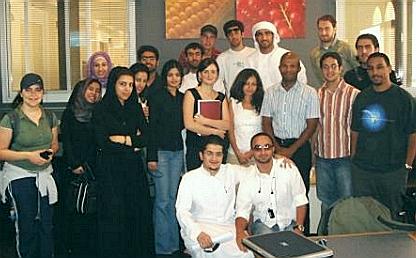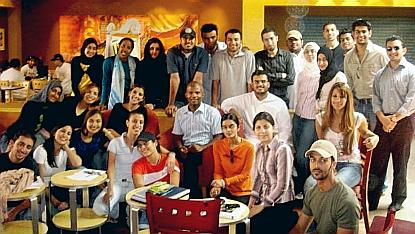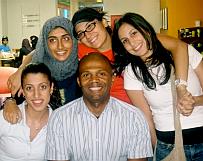
The noted blogger Fjordman is filing this report via Gates of Vienna.


Robert Spencer and Hugh Fitzgerald of Jihad Watch have a nickname for newspaper the New York Times, which they prefer to call
“the New Duranty Times” owing to what they perceive as its poor coverage of the global Islamic jihad. The name, of course, comes from
Walter Duranty, former Pulitzer Prize winner and Moscow correspondent for The New York Times in the 1930s. Duranty repeatedly denied the existence of a Ukrainian famine in 1932–33. In an article in NYT, August 24 1933, he claimed “any report of a famine is today an exaggeration or malignant propaganda,” while millions of people were dying. According to Spencer and Fitzgerald, this spirit of denial seems to be alive and well at the NYT 70 years later.
In the New York Times May 10, 2006, Alan Cowell wrote an article from Sweden entitled “An Economy With Safety Features, Sort of Like a Volvo.” Now, in all fairness, Mr. Cowell does mention potential problems in Sweden, not the least that massive immigration is rapidly changing what was once a very ethnically homogeneous nation state. “Up to 10 years ago it was very homogeneous as a country. Everything was very alike. Up until then all Swedes looked the same; almost thought the same. Because we are all so equal, we can share the pain of the problems.” However, at the same time Cowell indicates that Scandinavia may need even more immigration to finance its welfare state, and quotes a report by the European Policy Center, a research institute in Brussels, saying that “Scandinavia’s “negative approach towards immigration” might “represent the biggest threat to the long-term survival” of the Nordic model, since Scandinavian economies need “a constant flux of foreign talent and workers in general.” Still, despite these objections, Cowell concludes that “the economy prospers — even though taxes here remain high and big government administers cradle-to-grave social programs that absorb more than half of the national output” and that “compared with some other parts of Europe, there is still some optimism here.” This is sloppy journalism. If Cowell had done anything more than scratching the surface, he would have found that Europe is in the midst of massive waves of Muslim immigration that are in the process of transforming the continent into a post-Western entity some call “Eurabia.” Sweden is one of the leading countries in this process, quite possibly the worst of them all, and yet freedom of speech in debating these topics in public has become de facto so curtailed that one could question whether Sweden in 2006 is still a functioning democracy.
Cowell states that “Sweden’s official unemployment rate of 4.8 percent, many economists say, is distorted by the omission of people in government-financed retraining programs. The labor unions calculate the real figure at closer to 8 percent.” In fact, some Swedes believe that the real unemployment rate may be three times as big as even this higher estimate. Hans Karlsson, a leftwing heavyweight, concluded that true unemployment was more in the ballpark of 20-25%, not 5% as the government was claiming. Even the official numbers show that the Swedish economic model is in serious trouble. Young adults born in the 1980’s have an appreciably lower standard of living in Sweden than older generations. We can already see some major cracks in the Swedish welfare state. Sweden is struggling to pay the bills for the tens of thousands of workers on long-term disability and an expanding group of young people leaving the workforce altogether on so-called “early retirement.” 500,000 people are on early retirement in Sweden today, 68,000 of whom are between the ages of 20 and 40. “If the sick-leave levels in Sweden really were an indicator of how sick we are, we would be facing a plague here,” as one commentator put it.
High unemployment in Sweden will be tackled by creating more public sector jobs, even if that means breaking the government’s spending limits. That was the message from Göran Persson, Swedish Social Democratic prime minister. The jobs will be targeted mainly at young people and the long-term unemployed. They will be given jobs in government agencies, mainly doing desk jobs or looking after old people. Proposals that were highlighted by Persson included using the long-term unemployed to “help old people to hang curtains.”
Johnny Munkhammar of Timbro, a free market think-tank of Swedish Enterprise, explains that the Scandinavian model is not all it’s cracked up to be. Sweden had the second highest growth rate in the world from 1890 to 1950, but since the tax rate rose from 20 % in 1950 to 50 % in 1980 it had fallen behind. For example, according to the Organisation for Economic Co-operation and Development (OECD), Sweden was the fourth richest country per capita in the world in 1970 whereas now it is down to number 14, and falling. Maybe the welfare state only seemed to be a success in Scandinavia because these nations had been dynamic capitalist countries prior to this, ethnically homogeneous and based upon a Protestant work ethic. While this legacy kept the welfare system afloat for some time, it is now rapidly being eroded.
More immigrants should be allowed into Sweden in order to safeguard the welfare system. That’s the view of Pär Nuder, Sweden’s finance minister. However, in reality estimates indicate that immigration costs Sweden at least 40 to 50 billion Swedish kroner every year, probably several hundred billions, and has greatly contributed to bringing the Swedish welfare state to the brink of bankruptcy. An estimated cost of immigration of 225 billion Swedish kroner in 2004, which is not unlikely, would equal 17.5% of Sweden’s tax income that year, a heavy burden in a country where the overall tax burden between 1990 and 2005 on average was 61%, almost one and a half times the OECD average.
In neighboring Denmark, right-wing politicians are already debating the threat of a spillover of immigrant “welfare tourists,” should the Swedish system collapse. At the same time, statistics indicate that native Scandinavians will become a minority in their own countries within a couple of generations, if the current immigration trends continue. One thousand years ago Scandinavians were the barbarians of Europe, spreading fear and extracting “Danegeld” from their more civilized neighbors. In the 21st century Scandinavians are peaceful and soft-spoken, and the roles seem to have been reversed with certain newly arrived immigrants. While their political elites insist that immigration is “good for the economy,” Scandinavians are in reality funding their own colonization. Although the cost of welfare is significant, it pales in comparison to the price paid through rapidly declining social harmony and increasing insecurity caused by Muslim immigration. Some of the increase in insecurity is due to the rise of mafia groups and organized crime, but most is mainly due to terror threats and intimidation of critics of Islam and Muslim immigration.
Children in the Swedish city of Gothenburg are to become the first in the world to be given the vote in a referendum. Two official referenda will be held in which only children between 5 and 12 will be eligible to vote. The results of the polls will decide two local issues – the appearance of a new tram and the design of a new library card. A country that even gives the vote to 5-year-old children must be a model of democracy, right? Well, not necessarily, if the political elites treat the rest of the population as children, too. Jens Orback, Democracy Minister in the Social Democratic government, is worried about people who threaten and harass politicians and want these to face tougher penalties. Nearly three out of four Riksdag (parliament) deputies say that they have been subjected to harassment, threats or violence because of their positions. For elected representatives in local government the figure was around one in three. The minister blamed threats and violence against elected representatives “on the public’s lack of faith in politicians.”
But if Sweden is such a paradise, why are so many people angry with their politicians? Perhaps there is something going on beneath the surface? Maybe ordinary citizens feel that the political elites don’t want to deal with the issues they care about? Sweden is a semi-totalitarian country. It’s all about façade. On the surface, Sweden is a tolerant nation and peaceful democracy. In reality, there is massive media censorship by a closed elite that is scared of having a debate about immigration. Opinion polls have revealed that two out of three Swedes doubt whether Islam can be combined with Swedish society, and a very significant proportion of the population have for years wanted more limitations on immigration. Yet not one party represented in the Swedish Parliament is genuinely critical of the Multicultural society or the current immigration policies. The Swedish elite congratulate themselves that they have managed to keep “xenophobic” parties from gaining a foothold while the country is sinking underneath their feet.
 Jonathan Friedman is a New York Jew, now living with his Swedish wife in the southern Swedish city of Malmö where he teaches socio-anthropology. According to him, “no debate about immigration policies is possible, the subject is simply avoided. Sweden has such a close connection between the various powerful groups, politicians, journalists, etc. The political class is closed, isolated.”
Jonathan Friedman is a New York Jew, now living with his Swedish wife in the southern Swedish city of Malmö where he teaches socio-anthropology. According to him, “no debate about immigration policies is possible, the subject is simply avoided. Sweden has such a close connection between the various powerful groups, politicians, journalists, etc. The political class is closed, isolated.”
Two Swedish girls were sent home from school for wearing sweaters showing a tiny Swedish flag. The headmaster was concerned that this might be deemed offensive by some immigrants. Helle Klein, political editor of the newspaper Aftonbladet, boasts: “If the debate is going to be about whether there are problems with immigrants, we don’t want it.” Hans Bergström, former editor-in-chief of the Swedish newspaper Dagens Nyheter, worries that Sweden has become “a one-party state.” According to Friedman, the elites are nervous and worried to see their power slip away. And therefore they want to silence critics, as for instance the Sweden Democrats, a small rightist party outside parliament opposed to immigration. “It is a completely legal party, they just aren’t allowed to speak. It is absurdly undemocratic. They are marginalised. They are isolated and ridiculed. . . . and then they are called undemocratic.
In reality, the basis of democracy has been completely turned on its head. It is said: ‘democracy is a certain way of thinking, a specific set of opinions, and if you do not share them, then you aren’t democratic, and then we condemn you and you ought to be eliminated. The People? That is not democratic. We the Elite, we are democracy.’ It is grotesque and it certainly has nothing to do with democracy, more like a kind of moral dictatorship.”
 Before the national elections in the fall of 2006, members of all the established parties, including the so-called right-wing opposition, are cooperating in efforts to boycott any collaboration with the Sweden Democrats or other “xenophobic” parties after the elections. This is widely applauded by the Swedish media establishment. The majority of headmasters in Stockholm’s high schools want to block the Sweden Democrats from participating in pre-election debates at their schools because they disagree with their “perspective on humanity.” Party members can seldom hold meetings without being hassled by political hooligans, who make noise, destroy equipment or even resort to violence. Violent assaults and life threatening attacks against members of the Sweden Democrats, by Muslims or “anti-Fascists,” have taken place many times, but are rarely mentioned in the media. No dissent is tolerated in Sweden.
Before the national elections in the fall of 2006, members of all the established parties, including the so-called right-wing opposition, are cooperating in efforts to boycott any collaboration with the Sweden Democrats or other “xenophobic” parties after the elections. This is widely applauded by the Swedish media establishment. The majority of headmasters in Stockholm’s high schools want to block the Sweden Democrats from participating in pre-election debates at their schools because they disagree with their “perspective on humanity.” Party members can seldom hold meetings without being hassled by political hooligans, who make noise, destroy equipment or even resort to violence. Violent assaults and life threatening attacks against members of the Sweden Democrats, by Muslims or “anti-Fascists,” have taken place many times, but are rarely mentioned in the media. No dissent is tolerated in Sweden.
In one such attack, which extreme Leftists were later openly bragging about on the Internet, around 30 members of the Sweden Democrats were attending a private party outside the town of Växjö. “To clearly demonstrate that the Sweden Democrats are not welcome in our area, about 20 anti-Fascists chose to attack the party.” “The Sweden Democrats were attacked with knives, axes, iron bars and other weapons. After that, their cars were destroyed.” The brave Leftists then smashed the windows and threw tear gas into the building, forcing people outside, where they were again attacked and beaten with iron bars and axes. Several of the people were hospitalized after the attack. This was a peaceful, private party by unarmed members of a perfectly legal political party that just happens to be critical of the country’s immigration policies. These brave Leftists or “anti-Fascists” do, for some curious reason, seem to behave pretty much like, well, Fascists, a bit like the Brown Shirts in the 1930s, physically assaulting political opponents to silence them. In another incident in Stockholm, members of the Sweden Democrats handing out leaflets for the party were attacked by a group of extreme Leftists, who started beating and kicking them. One of them got tear gas sprayed in his face. According to Oscar Sjöstedt from the Sweden Democrats in Stockholm, this was the third tear gas attack against them in a few months.
Seemingly encouraged by the silence over these attacks from the police and the political establishment, who seem in no rush to stop these assaults on troublesome political opponents, the extreme Leftists have recently stepped up their attacks to also include mainstream parties represented in parliament. Two windows were smashed at the Centre Party’s offices in Stockholm. Several of the Centre Party’s offices around the country have been vandalised. A party representative said that they suspected that the attacks were in protest against the party’s proposal for special labour agreements for newly employed young people. Similar attacks have been carried out elsewhere. On the Internet and at demonstrations, a ‘faction of the Invisible Party’, a group said to be extreme left anarchists, has claimed responsibility for the attacks.
 While critics of immigration are demonized in Sweden, Communists are much more accepted. The Left Party is a support party for the current Swedish Social Democratic government, whose party does not hold a majority in parliament by itself. Leader of the Left Party, Lars Ohly, has called himself a Communist after he was elected party leader. In 1999, a decade after the fall of the Berlin Wall, he stated that: “I stand for a modern Leninism based on class struggle.” He has also said that “we must never accept a conception of democracy elevated far above the class struggle.” Senior party members had close contact with the repressive regimes in Eastern Europe during the Cold War. In Sweden, it is OK to openly support an ideology that killed 100 million people during the 20th century and enslaved millions more, but “undemocratic” to call for limitations in Muslim immigration.
While critics of immigration are demonized in Sweden, Communists are much more accepted. The Left Party is a support party for the current Swedish Social Democratic government, whose party does not hold a majority in parliament by itself. Leader of the Left Party, Lars Ohly, has called himself a Communist after he was elected party leader. In 1999, a decade after the fall of the Berlin Wall, he stated that: “I stand for a modern Leninism based on class struggle.” He has also said that “we must never accept a conception of democracy elevated far above the class struggle.” Senior party members had close contact with the repressive regimes in Eastern Europe during the Cold War. In Sweden, it is OK to openly support an ideology that killed 100 million people during the 20th century and enslaved millions more, but “undemocratic” to call for limitations in Muslim immigration.
The website “The Local”, a good source of Swedish news translated to English, notes that it looks increasingly likely that any government led by the Social Democrats will also include the Left Party in a formal coalition after this fall. Apart from quoting approvingly from Marx’s Communist Manifesto, “the party’s economic policy document contains such gems as a six hour working day, renationalization of previously state-owned companies, and policies for large companies to be taken over by workers or the state.” For the past two parliaments, the Social Democrats have ruled with support from the Greens and the Left Party, but neither party has been given a formal place in government. Soon, Sweden “could have cabinet ministers arguing for large tax increases in a country which already has one of the world’s highest tax burdens. Alternatively, they could be demanding nationalization of industry in a country where the state already owns mining companies, mortgage lenders, drinks makers, pharmacies and betting companies.” The leader of the Left Party is putting his foot down before national elections this September. If the Left Party doesn’t get a ministerial post, Lars Ohly told newspaper Dagens Nyheter his party might not support a Social Democrat-led minority government.
Swedish blog the Stockholm Spectator comments on the strong support for these “reformed” Communists among Swedish journalists, documented by opinion polls: “Unlike the American media landscape, where accusations of bias are routinely leveled and ritually denied, it isn’t uncommon in Sweden to admit that coverage is lop-sided. Left-wing journalist Jan Guillo, responding to a study showing a disproportionate amount of Left Party (former Communist party) voters in Stockholm newsrooms, admitted that “The statistics are true…There is a definite overrepresentation of leftists in the media world.” The same Guillo has also bragged about the fact that unlike Scandinavian neighbors Norway and Denmark, Sweden doesn’t have a significant political party critical of Muslim immigration. This is, according to him, because Swedish intellectuals have stuck together to prevent this from happening. “Swedish Radio correspondent Ceclia Udden who, when accused of systematic bias in covering the American election, blithely agreed with her critics and expressed bewilderment as to why anyone would be bothered by such trivialities. “On such issues as the US right and Israel…there was a Swedish…consensus, and any reporting had to be based on that,” she said.”
Ethnologist Maria Bäckman, in her study “Whiteness and gender,” has followed a group of Swedish girls in the suburb of Rinkeby outside Stockholm, where native Swedes have been turned into a tiny minority of the inhabitants due to rapid immigration. The subjects of the study were “teenage girls, living in the suburbs, who are identified both by themselves and by others as Swedish. But they are Swedes living in what is usually called an immigrant suburb. Thus they are seen as different.” “They may encounter prejudices such as the idea that Swedish girls act and dress in a sexually provocative way or that blonde girls are easy.” Bäckman relates that several of the girls she interviewed stated that they had dyed their hair to avoid unwanted attention and sexual harassment. They experienced that being blonde involves old men staring at you, cars honking their horns and boys calling you “whore.” We thus have a situation where being blonde in certain areas of Sweden means being a target of harassment. The Norwegian newspaper Aftenposten visited Rinkeby to find out if the rumors were true. They spent several hours there, in a suburb of the Swedish capital, without finding a single blonde, Swedish girl. Almost all the inhabitants there are of immigrant background. Virtually none of them referred to themselves as Swedish, they usually said they came from somewhere else. Many of them also asked the journalists questions about Swedes, to hear what they are like. They thought Swedes were idiots, but they hardly ever met any of them.
A report from organization Save the Children tells of how being a young Swedish girl today means feeling unsafe. The girls are scared of being raped, a possibility that appears very real to them. Many girls are planning how to go home at night, how to pretend to be talking on the mobile phone, how to keep their keys in their hand to defend themselves or how to simply run all the way home. Both the fear and the choice of strategies indicate that many girls feel genuinely unsafe outdoors during certain hours of the day. The fear is well founded. A striking number of girls have experienced harassment from boys or men. Most frequently, the harassment comes from boys of the same age as the girls. Being called “whore” has become so common in some schools that several of the girls say the teachers no longer react to this.
 Tensta is a suburb in northern Stockholm with a very high concentration of immigrants. Nalin Pekgul, a member of parliament between 1994 and 2002, recently left Tensta because she thought it had become too unsafe. “I understood then that many are wearing bulletproof vests here. What has happened here, I wondered. Is this Tensta?” Pekgul, who is a Muslim herself, has also noted that fundamentalistic variants of Islam are growing stronger in Tensta. Her children come home and wonder why their mother doesn’t wear a hijab or why their family don’t go to the mosque. “I don’t like it when my son comes home and says that ‘Mom, we Muslims don’t lie, but Christians do, because they don’t have God.’ He hasn’t got that from us,” she says. Actress Ylva Törnlund has visited several schools in Tensta, and was alarmed by the harsh atmosphere she discovered there. “The attitudes we meet in the schools are frightening. One boy talked about how girls should be f**ked to pieces until they bleed,” Törnlund said. She decided to visit the area after a rape that took place in a public bath nearby in broad daylight. A 17-year-old girl was raped, and none of the other guests did anything to stop this. The girl was first approached by a 16-year-old boy. He and his friends followed her as she walked away into a grotto, and inside the grotto he got her blocked in the corner, ripped off her bikini and raped her, while his friend held her firm.
Tensta is a suburb in northern Stockholm with a very high concentration of immigrants. Nalin Pekgul, a member of parliament between 1994 and 2002, recently left Tensta because she thought it had become too unsafe. “I understood then that many are wearing bulletproof vests here. What has happened here, I wondered. Is this Tensta?” Pekgul, who is a Muslim herself, has also noted that fundamentalistic variants of Islam are growing stronger in Tensta. Her children come home and wonder why their mother doesn’t wear a hijab or why their family don’t go to the mosque. “I don’t like it when my son comes home and says that ‘Mom, we Muslims don’t lie, but Christians do, because they don’t have God.’ He hasn’t got that from us,” she says. Actress Ylva Törnlund has visited several schools in Tensta, and was alarmed by the harsh atmosphere she discovered there. “The attitudes we meet in the schools are frightening. One boy talked about how girls should be f**ked to pieces until they bleed,” Törnlund said. She decided to visit the area after a rape that took place in a public bath nearby in broad daylight. A 17-year-old girl was raped, and none of the other guests did anything to stop this. The girl was first approached by a 16-year-old boy. He and his friends followed her as she walked away into a grotto, and inside the grotto he got her blocked in the corner, ripped off her bikini and raped her, while his friend held her firm.
“It is not as wrong raping a Swedish girl as raping an Arab girl,” says Hamid, in an interview about another gang rape involving a Swedish girl and immigrant perps. “The Swedish girl gets a lot of help afterwards, and she had probably f**ked before, anyway. But the Arab girl will get problems with her family. For her, being raped is a source of shame. It is important that she retains her virginity until she marries.”“It is far too easy to get a Swedish whore…… girl, I mean;” says Hamid, and laughs over his own choice of words. “Many immigrant boys have Swedish girlfriends when they are teenagers. But when they get married, they get a proper woman from their own culture who has never been with a boy. That’s what I am going to do. I don’t have too much respect for Swedish girls. I guess you can say they get f**ked to pieces.” The number of rape charges in Sweden has quadrupled in just above twenty years. Rape cases involving children under the age of 15 are six times as common today as they were a generation ago. Resident aliens from Algeria, Libya, Morocco and Tunisia dominate the group of rape suspects. Lawyer Ann Christine Hjelm, who has investigated violent crimes in one court, found that 85 per cent of the convicted rapists were born on foreign soil or by foreign parents.
The official explanation given by Swedish authorities to this increase is that much of it is a “technical” increase due to the fact that more victims of rape now report this crime to the police. There is not a hint of evidence for this explanation. On the contrary, intimidation of people reporting any kind of crime to the police has rapidly worsened in Sweden during the same time period. Threats against witnesses in Swedish court cases quadrupled between 2000 and 2003 alone. Besides, there is a lack of trust among the general public in the efficiency of their police force. Street violence of all kinds is soaring on a national level. Private security companies are in great demand in major Swedish cities, as a serious lack of police to combat rising crime has made many citizens tired of being robbed. The number of reported cases of physical abuse/assault in Stockholm has tripled in three decades. The number of people under the age of 18 who are serving sentences in juvenile detention centres has risen sharply over the last five years. Gangs of 14- and 15-year-olds raping and robbing is now common in many Stockholm suburbs. Mafia networks demanding protecting money from private businesses are increasingly common. Organized crime is no longer just a problem in the major cities. It has now spread throughout most of Sweden. At the same time, the underfunded and undermanned Swedish police officers feel “unmotivated” to fight crime, according to a study made by police researcher Stefan Holgersson, who interviewed 2000 Swedish police officers.
One person who seems to have a better grasp than Mr. Cowell of what’s happening with Muslim immigration in Sweden and Europe is Christopher Caldwell, who has written several articles about the topic, including one in the New York Times in February 2006 called “Islam on the Outskirts of the Welfare State.” Visting the Stockholm immigrant suburb of Rinkeby, Caldwell asked whether something like the French riots of the fall of 2005, with burning cars and rampaging gangs, could happen in Sweden. “Absolutely,” said one lanky boy near the window. “People burn cars here all the time. Not because they’re angry — because they think it’s fun.” In January, former Swedish MP Nalin Pekgul had a public discussion with the French feminist Fadela Amara about changes in France. “Whenever she talked about France,” Pekgul recalls, “it sounded like we were undergoing the same changes France did, only 10 years behind. It was the first time I had thought: I’m going to have to leave. It’s not going to get better.” Caldwell also noted, while mentioning the fact that immigrants still tend to marry someone from their original homeland, that in Sweden, unlike Denmark, “public discussion of this kind of endogamy is muted, although Swedes complain in private that it slows integration and unacceptably widens the number of potential new immigrants. “It’s nothing you can talk about,” says one educator at a Million Program school. “In general, we despise the Danes for raising this.” The rise of a right-wing anti-immigrant party, along the lines of the Danish People’s Party, appears unlikely in Sweden.”
Meanwhile, the Islamization of Sweden is proceeding apace. In the spring of 2006, Sweden’s largest Muslim organisation demanded in a letter, signed by its leader Mahmoud Aldebe, that Sweden introduce separate laws for Muslims. The proposals included allowing imams into state (public) schools to give Muslim children separate lessons in Islam and their parents’ native languages. The letter also said that boys and girls should have separate swimming lessons and that divorces between Muslims should be approved by an imam. The letter was a list running over several pages with aggressive demands for just about everything; separate family laws for Muslims, regulating marriage and divorce, that public schools should employ imams to teach homogeneous classes of Muslims children in their religion and the language of their original homeland, and a “mosque in every municipality to be built through interest-free loans made available by the local municipalities.” This to “demonstrate “Islam’s right to exist in Sweden” and to “heighten the status of and respect towards Muslims.” Sweden’s Equality Minister Jens Orback called the proposals “completely unacceptable.”
That sounds encouraging. However, it looks increasingly as if the election in September will be a very close race, and the Leftist parties will be dependent upon the support of immigrants, who tend to vote for Leftist parties all over Europe, to remain in power. As Nima Sanandaji points out in FrontPage Magazine, “Swedish public television exposed that the leading Social Democratic party had started fishing for votes with the help of radical Muslim clergies.” For several years the Christian wing of the Social Democratic party, called The Brotherhood, has been working with the influential Muslim leader Mahmoud Aldebe, president of Sweden’s Muslim Association. Already in 1999, Aldebe proposed that sharia, Islamic law, should be introduced in Sweden. After an honor killing of a Kurdish girl in 2003, Aldebe did not condemn the murderers. Aldebe sees the entire debate regarding honor-related murders as an attack against the Islamic religion and claims in a letter that a public debate regarding these acts of murder risks “encourag[ing] immigrant girls to revolt against the tradition of the families and their religious values.” After the last election in 2002, Sweden’s Muslim Association sent a congratulation letter to the re-elected Social Democratic Prime minister Göran Persson, congratulating him on his victory and hoping that Persson would work for implementing some of the demands of the Association in the future. The Muslim Brotherhood has earlier stated that for them, “Sweden is in many ways an ideal country, [and it] shares the ideals of the [Swedish] Social Democrats in their view of the welfare society. Leading figures in Muslim congregations are also active within the Social Democratic [Party], and have very good relations with Sweden’s Christian Social Democrats. “The Social Democrats have, in turn, and perhaps as thanks for the support they receive from the mosque leadership, shown a tendency to shy away from the fact that there is extremism in some of our mosques. This has given the Muslim Brotherhood the freedom to force its ideology upon [the mosque’s worshippers].”
During the spring of 2006, by granting a visa to Hamas “refugee minister” Atef Edwane, Sweden enabled the terrorist representative to visit any other European country who had signed the Schengen Accord. Atef Edwane visited Norway and Germany as part of a European tour, despite a European Union policy of no contact with the radical movement. As sensible Swedish blogger Dick Erixon pointed out, it seems as if the Social Democratic Swedish government are more willing to be dealing with Islamic terrorist organizations such as Hamas than with the Sweden Democrats or native Swedes wanting to limit Muslim immigration. At the same time, PM Göran Persson stated that “the government made an error when it allowed the Swedish Air Force to undertake exercises together with Israel.” The Air Force took part in exercises with Israel in 2005 in Canada. Sweden also decided to withdraw from an international air force exercise to be held in Italy in May 2006, after learning that units from the Israeli air force would participate. After the Hamas visa story, Israeli authorities called Sweden “the most anti-Israeli country in Europe,” which in the Eurabia of 2006 is quite an achievement. Sweden is a neutral country, and its concept of “neutrality” has in the past frequenly implied appeasing the anti-democratic forces of the day. In a process we might label “Swedish jumping,” Sweden appeased the Nazis in the 1930s and later the Communists and the Soviet Union during the Cold War. Sticking to form, it is appeasing the Islamic world now.
Earlier in 2006, Swedish Chancellor of Justice Mr Göran Lambertz decided to discontinue his department’s pre-trial investigation into the Grand Mosque of Stockholm, where audio cassettes with highly inflammatory anti-Semitic content were being sold. After Swedish radio programme Dagens Eko unveiled the contents of the cassettes in November 2005, a charge of racial incitement was filed. The Swedish Chancellor of Justice responded by closing the pre-trial investigation on the grounds that “the lecture did admittedly feature statements that are highly degrading to Jews (among other things, they are consistently referred to as the brothers of apes and pigs)” but pointing out that such statements “should be judged differently – and therefore be regarded as permissible – because they were used by one side in an ongoing and far-reaching conflict where calls to arms and insults are part of the everyday climate in the rhetoric that surrounds this conflict.” In Sweden, an anti-Semitic crime is reported to the police once every three days. The Jewish congregations in major cities Stockholm, Göteborg and Malmö are forced to spend up to 25 percent of their membership fees on security and hired guards. And most of these hate crimes are perpetrated by Muslims. There are reports of Swedish Jews who have signed up for service in the Israeli Defence Forces to escape harassment and persecution in Sweden. Even some non-Jews from Sweden say they feel “liberated” when they go to Israel. In Israel, you know who the country’s enemies are, and you are prepared to fight for your country and for your convictions. It is hard to overstate the extent to which Sweden is a politically repressed nation, thanks to self-proclaimed guardians of the Multicultural Truth. Swedish historian of religion Matthias Gardell claims that Islamophobia is perhaps the greatest threat to democracy in the Western world today. Swedish writer and leftist intellectual Jan Guillou has stated that the rhetoric employed by the Nazis against Jews is now used to target Muslims.
In a Sociological survey entitled “Vi krigar mot svenskarna” (“We’re waging a war against the Swedes”), young immigrants in the troubled city of Malmö have been interviewed about why they are involved in crime. Malmö, Sweden’s third largest city, and set to become the first major Scandinavian city with a Muslim majority within a decade or two, has got nine times as many reported robberies per capita as Copenhagen, Denmark. The wave of robberies the city has witnessed is part of a “war against Swedes.” This is the explanation given by young robbers with immigrant background on why they are only robbing native Swedes, in interviews with Petra Åkesson. “I read a report about young robbers in Stockholm and Malmö and wanted to know why they are robbing other youths. It usually doesn’t involve a lot of money,” she says. She interviewed boys between 15 and 17 years old, both individually and in groups. Almost 90% of all robberies that are reported to the police were committed by gangs, not individuals. “When we are in the city and robbing, we are waging a war, waging a war against the Swedes.” This argument was repeated several times. “Power for me means that Swedes shall look at me, lie down on the ground and kiss my feet.” The boys explain, laughingly, that “there is a thrilling sensation in your body when you’re robbing, you feel satisfied and happy, it feels as if you’ve succeeded, it simply feels good.” “It’s so easy to rob Swedes, so easy.” “We rob every single day, as much as we want to, whenever we want to.” The immigrant youth view Swedes as stupid and cowardly: “The Swedes don’t do anything, they just give us the stuff. They’re so wimpy.” The young robbers don’t plan their crimes: “No, we just see some Swedes that look rich or have nice mobile phones and then we rob them.”
A high school teacher in Malmö discovered that about a dozen Arab students were laughing and shouting “Allahu Akbar!” while watching a DVD of infidel hostages being beheaded in Iraq. The headmaster didn’t think the incident was such a big deal.
 At least 139 schools in Sweden suffered arson attacks during 2002 alone. Björn Vinberg from the fire department in Kroksbäck in the Malmö area says it’s humiliating and degrading to put out fires again and again in the same immigrant areas, with school kids laughing at them and lighting a new one just afterwards. His colleagues have been to the same place no less than twenty times, all totally unnecessary. In the spring of 2006, a section of a school in Malmö was decided to be closed, due to “lack of security, vandalism and poor study results”. The school had been vandalised several times and in January part of it was damaged in an arson attack. “It’s the first time a school in Sweden has been closed because it is too rowdy,” said Jan Björklund, who saw the decision as giving in to discipline problems.
At least 139 schools in Sweden suffered arson attacks during 2002 alone. Björn Vinberg from the fire department in Kroksbäck in the Malmö area says it’s humiliating and degrading to put out fires again and again in the same immigrant areas, with school kids laughing at them and lighting a new one just afterwards. His colleagues have been to the same place no less than twenty times, all totally unnecessary. In the spring of 2006, a section of a school in Malmö was decided to be closed, due to “lack of security, vandalism and poor study results”. The school had been vandalised several times and in January part of it was damaged in an arson attack. “It’s the first time a school in Sweden has been closed because it is too rowdy,” said Jan Björklund, who saw the decision as giving in to discipline problems.
While this was going on, the number one priority for the political class in Sweden seemed to be demonizing neighboring Denmark for “xenophobia” and a “brutal” debate about Muslim immigration. During the Jihad riots in France in the fall of 2005, Sweden’s Social Democratic Prime Minister Göran Persson criticised the way the French government handled the unrest in the country. “It feels like a very hard and confrontational approach.” Persson also rejected the idea of more local police as a “first step” in Sweden. “I don’t believe that’s the way we would choose in Sweden. To start sending out signals about strengthening the police is to break with the political line we have chosen to follow,” he said. Meanwhile, as their authorities have largely abandoned their third largest city to creeping anarchy, there is open talk among the native Swedes still remaining in Malmö of forming vigilante groups, armed with baseball bats and concern for their children’s safety. At the same time, Muslim immigration to the country is not just continuing, but growing. Sweden’s population was growing faster in 2006 than at any time during the last twelve years. Statistics Sweden calculated that immigration increased by almost 85% compared with the first quarter the previous year. Most of these people came from Muslim countries such as Iraq, Somalia and Bosnia Herzegovinia.
What happened to the famous Swedish nanny state, you say? Don’t Swedes pay the highest tax rates in the world? Yes, they do. But tens of billions of kroner, some say several hundred billions, are being spent every year on propping up rapidly growing communities of Muslim immigrants. Sweden has become the entire world’s welfare office, because the political elites have decided that massive Muslim immigration is “good for the economy.” Pretty soon, Sweden could have an “army” of just 5000 men. That’s five thousand troops to defend a nation that is geographically more than three times the size of England. And it may take up to a year to assemble all of them, provided they are not on peacekeeping missions abroad. That Sweden could soon need a little peacekeeping at home seems to escape the establishment. In 2006, the celebrated Swedish welfare state has become the world’s largest pyramid scheme, an Enron with a national flag. Just as the country was in the midst of the worst crime wave in modern Scandinavian history, with a desperately underfunded police force, the Swedish Social Democrats announced that cheaper public dental care would be a major issue in the election campaigns. There could hardly be a better symbol of Europe’s love affair with the welfare state and “social security” in an age where physical security is rapidly disappearing through runaway Muslim immigration. “Eurabia: You may get your teeth kicked in, but at least you have cheap dental care” could become the slogan for the entire continent. The Swedish elites, especially the Socialists who are supposed to represent “the people,” seem to care little for the well-being of their own citizens, and much more for clinging on to power and polishing their image abroad. As Jonathan Friedman, professor of social anthropology at the University of Lund outside Malmö puts it: “In Sweden, it’s almost as if the state has sided with the immigrants against the Swedish working class.”
Yet despite of all of this, Alan Cowell writes in the New York Times that Sweden is full of “safety features, sort of like a Volvo.” Why didn’t he also ask some of the political dissidents about the state of the country, such as Ulf Nilson, challenging censorship through his essays at the Expressen newspaper, Jan Milld of the website Blågula frågor or Danish blogger Steen writing at Snaphanen, with great coverage of developments in Sweden? The reality is that the “Swedish model” in 2006 no longer refers to a stable and peaceful state with an advanced economy, but increasingly to a Eurabian horror story of utopian Multiculturalism, Socialist mismanagement and runaway immigration. The strains caused by immigration are now so large that unless something serious is done about this, pretty soon Sweden will face the same kind of riots we have recently seen in France, and will approach the point of permanent ethnic and religious strife.
Swedish politicians and media need to put the well-being of their sons and daughters above that of Political Correctness and their own Multicultural, ideological vanity, and it is shocking that they actually need to be reminded of this. It is an international embarrassment to Sweden as a nation that Swedes travel around the world to lecture about women’s rights, and at the same time their own young women are finding that their most basic rights, such as being able to go outside wearing normal clothes without being harassed, are slipping away. Unless Swedish authorities are able to provide basic security to a population that pays some of the highest tax rates in the world, the cabinet of Prime Minister Göran Persson should publicly admit its inadequacy and resign from office. At the very least, it should be honest enough to tell Swedish citizens that they must provide security for themselves, and stop making it difficult for people to do this.
The Swedish general elections are just a few months away, and this time, Muslim immigration needs to be raised to the very top of the public agenda. Failing to do so now could have potentially disastrous consequences later. Time is running out, both for Sweden and for much of Western Europe.
 Those who followed the Mohammed Cartoon Caper will remember Danish imam Raed Hlayhel. After the Motoons were published last year in Denmark’s Jyllands-Posten, a carefully staged uproar started in the Danish Muslim community.
Those who followed the Mohammed Cartoon Caper will remember Danish imam Raed Hlayhel. After the Motoons were published last year in Denmark’s Jyllands-Posten, a carefully staged uproar started in the Danish Muslim community.
 In the last few days I have received quite an education about beryllium, thanks to the distributed intelligence of the internet. After the Swedish anthrax post got linked all over the blogosphere, the comments and emails started coming in.
In the last few days I have received quite an education about beryllium, thanks to the distributed intelligence of the internet. After the Swedish anthrax post got linked all over the blogosphere, the comments and emails started coming in.


 My interests are limited to a very narrow subset of questions that fall under the questions “economics of technical progress”. I look at the consequences on firm performance and organization structure from the adoption of information technology. My focus in my thesis was on the retail sector. Now I also investigate quality measure of software and business process patents. I have a paper with a co-author coming out soon in The Berkeley Journal of Law and Technology. It’s very good to read it you have trouble getting to sleep one night.
My interests are limited to a very narrow subset of questions that fall under the questions “economics of technical progress”. I look at the consequences on firm performance and organization structure from the adoption of information technology. My focus in my thesis was on the retail sector. Now I also investigate quality measure of software and business process patents. I have a paper with a co-author coming out soon in The Berkeley Journal of Law and Technology. It’s very good to read it you have trouble getting to sleep one night.

 Robert Spencer and Hugh Fitzgerald of Jihad Watch have a nickname for newspaper the New York Times, which they prefer to call
Robert Spencer and Hugh Fitzgerald of Jihad Watch have a nickname for newspaper the New York Times, which they prefer to call  Jonathan Friedman
Jonathan Friedman  Before the national elections in the fall of 2006, members
Before the national elections in the fall of 2006, members  While critics of immigration are demonized in Sweden,
While critics of immigration are demonized in Sweden, 
 At least 139 schools in Sweden suffered arson attacks during 2002 alone. Björn Vinberg from the fire department in Kroksbäck in the Malmö area says it’s humiliating and degrading to put out fires again and again in the same immigrant areas, with school kids laughing at them and lighting a new one just afterwards. His colleagues have been to the same place no less than twenty times, all totally unnecessary. In the spring of 2006, a section of a school in Malmö was
At least 139 schools in Sweden suffered arson attacks during 2002 alone. Björn Vinberg from the fire department in Kroksbäck in the Malmö area says it’s humiliating and degrading to put out fires again and again in the same immigrant areas, with school kids laughing at them and lighting a new one just afterwards. His colleagues have been to the same place no less than twenty times, all totally unnecessary. In the spring of 2006, a section of a school in Malmö was 
 Calling all you old hippies: remember the
Calling all you old hippies: remember the 


 Gloom and foreboding were the order of the day in Britain. Everyone knew that terrible events were coming, but not just yet. While their governments prepared for war, people in Britain went about their normal affairs. The autumn of 1939 was the last time of normalcy that Western Europe would know.
Gloom and foreboding were the order of the day in Britain. Everyone knew that terrible events were coming, but not just yet. While their governments prepared for war, people in Britain went about their normal affairs. The autumn of 1939 was the last time of normalcy that Western Europe would know. Some of our readers (I can’t remember who they are!) requested sidebar links to my Louis Macneice posts, so I’ve added them to the template. Just scroll down past the “Important Posts” links and “The Poetry of War” links, and you’ll see them.
Some of our readers (I can’t remember who they are!) requested sidebar links to my Louis Macneice posts, so I’ve added them to the template. Just scroll down past the “Important Posts” links and “The Poetry of War” links, and you’ll see them.